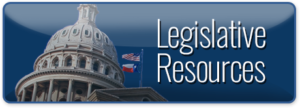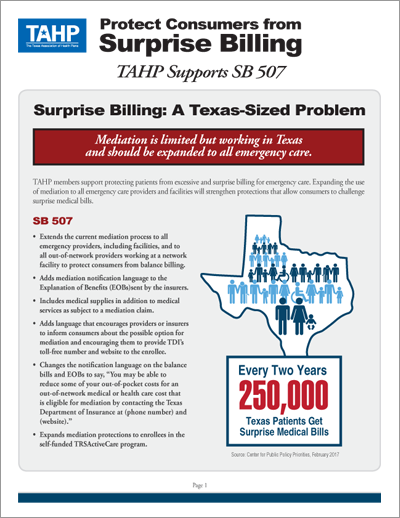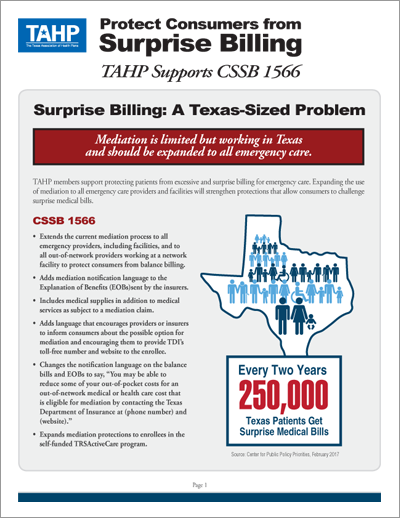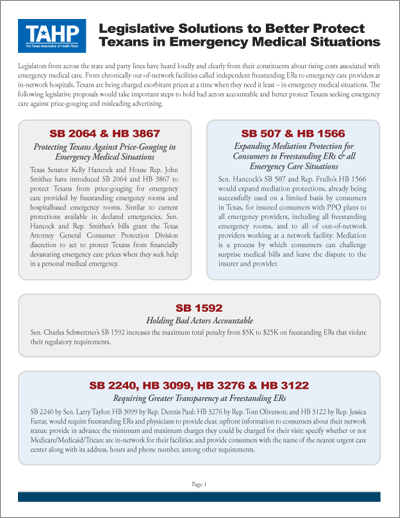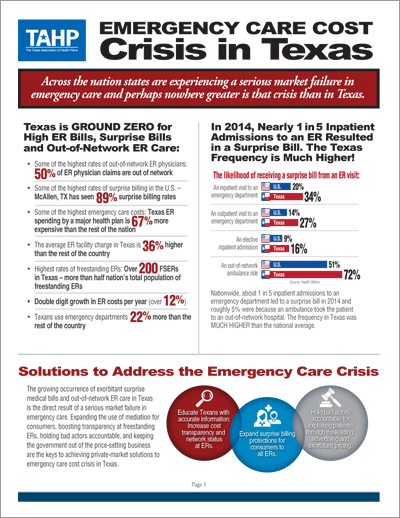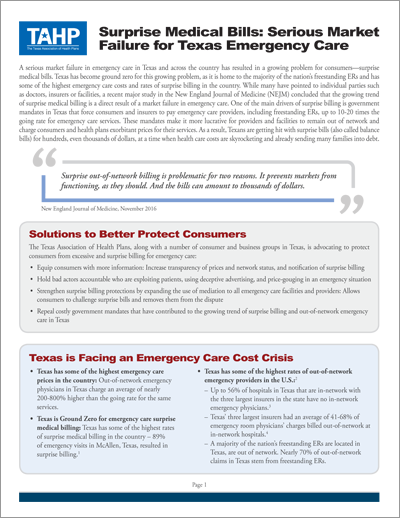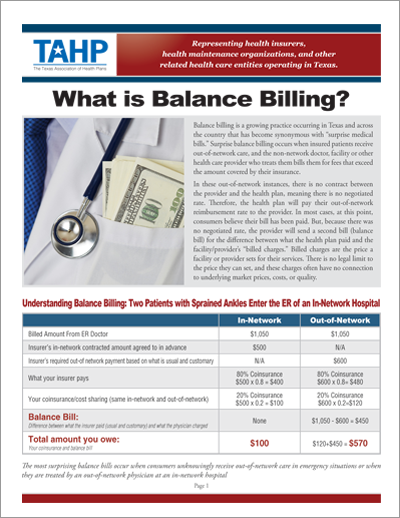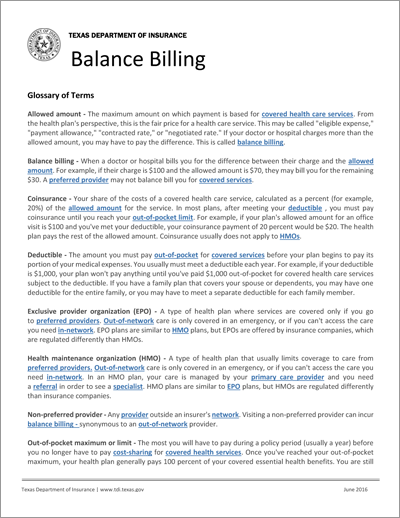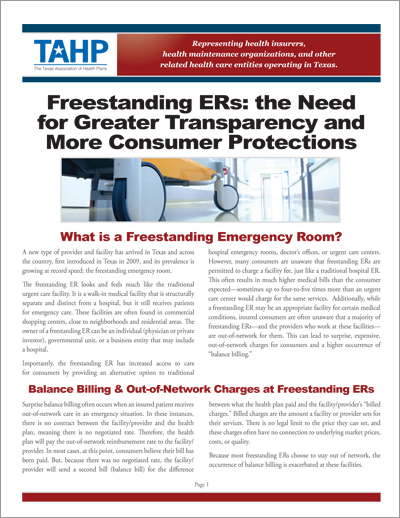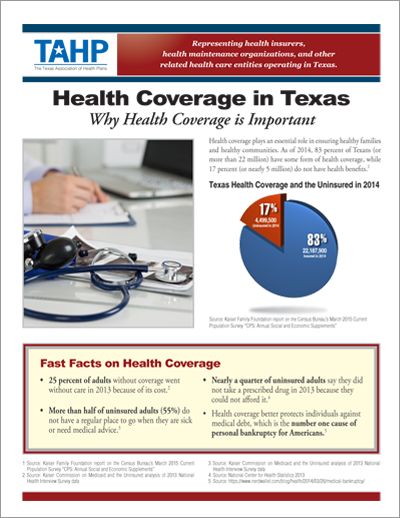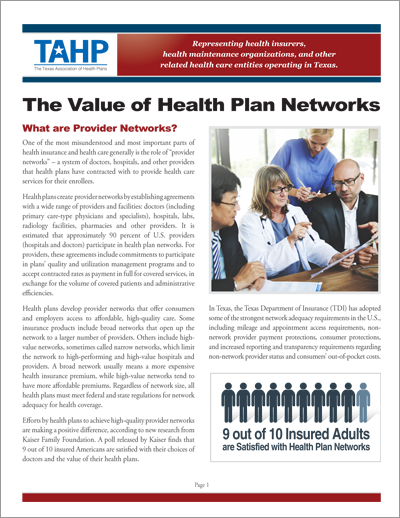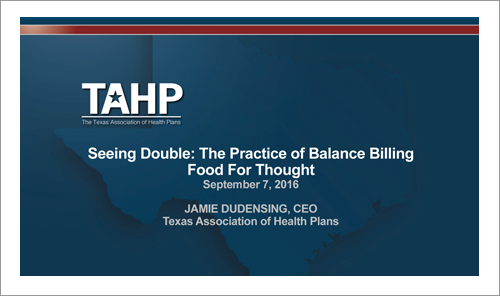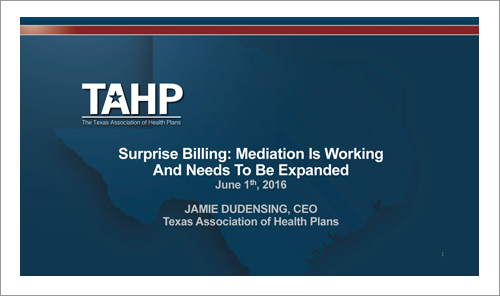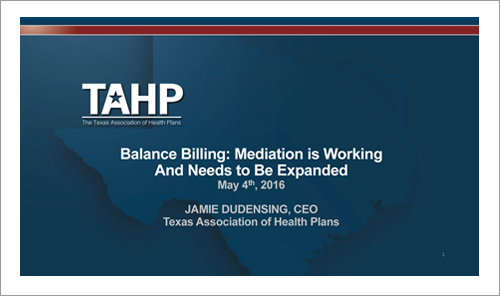Surprise Billing
An Unnecessary Threat to Texans’ Financial Security

Balance billing is a growing practice occurring in Texas and across the country that has become synonymous with “surprise medical bills.” Surprise balance billing occurs when insured patients receive out-of-network care, and the non-network doctor, facility or other health care provider who treats them bills them for fees that exceed the amount covered by their insurance. Emergency care, out-of-network hospital-based providers, and out-of-network freestanding ERs represent most of the sources of surprise billing in Texas.
In these out-of-network instances, there is no contract between the provider and the health plan, meaning there is no negotiated rate. Therefore, the health plan will pay their out-of-network reimbursement rate to the provider. In most cases, at this point, consumers believe their bill has been paid. But, because there was no negotiated rate, the provider will send the patient a second bill (balance bill) for the difference between what the health plan paid and the facility/provider’s “billed charges.” Billed charges are the price a facility or provider sets for their services. There is no legal limit to the price they can set, and these charges often have no connection to underlying market prices, costs, or quality.
TAHP members support protecting consumers from surprise billing by expanding the option to use the process of mediation–currently being used successfully by Texans on a limited basis to challenge surprise bills–to all emergency care and hospital-based providers. We also support increasing provider transparency of network status and prices, and providing regulatory oversight for unfair billing patterns and price-gouging in an emergency medical situation.
Surprise Billing Resources:
Protect Consumers from Surprise Billing: TAHP Supports SB 507
A guide to proposed legislative solutions to expand the use of mediation.
May 2017
TAHP members support bills such as SB 507 that protect patients from excessive and surprise billing for emergency care. Expanding the use of mediation to all emergency care providers and facilities will strengthen protections that allow consumers to challenge surprise medical bills. In addition to other consumer protections, SB 507 extends the current mediation process to all emergency providers, including facilities, and to all out-of-network providers working at a network facility to protect consumers from balance billing.
Protect Consumers from Surprise Billing: TAHP Supports CSSB 1566
A guide to proposed legislative solutions to expand the use of mediation.
March 2017
Mediation helps protect consumers from surprise billing, and although it’s working in Texas its use is limited. CSSB 1566 expands the use of mediation to all emergency care providers and facilities, and includes medical supplies in addition to services. TAHP supports this bill that will strengthen protections that allow consumers to challenge surprise medical bills.
Legislative Solutions to Protect Texans in Emergency Situations
A guide to proposed legislative solutions to better protect Texans seeking emergency care.
March 2017
In the 85th Texas Legislature, legislators have introduced 9 individual bills to address concerns about the rising costs associated with emergency medical care in Texas. This resource guide provides an overview of those proposals and background information on the emergency care cost crisis in Texas.
Emergency Care Cost Crisis in Texas
Infographics and resource guide on hidden, expensive costs in Texas emergency care.
March 2017
Across the nation states are experiencing a serious market failure in emergency care and perhaps nowhere greater is that crisis than in Texas. Texas has some of the highest rates of surprise medical billing and out-of-network emergency doctors, and some of the highest costs for emergency care in the country.
Surprise Medical Bills: Serious Market Failure for Texas Emergency Care
Learn more about the growing trend of surprise medical bills and ideas to better protect consumers and hold bad actors accountable.
January 2017
A serious market failure in emergency care in Texas and across the country has resulted in a growing problem for consumers—surprise medical bills. Texas has become ground zero for this growing problem, as it is home to the majority of the nation’s freestanding ERs and has some of the highest emergency care costs and rates of surprise billing in the country. One of the main drivers of surprise billing is government mandates in Texas that force consumers and insurers to pay emergency care providers, including freestanding ERs, up to 10-20 times the going rate for emergency care services. TAHP advocates for greater protections for consumers to challenge surprise bills, holding bad actors accountable for price-gouging in emergency situations, and repealing costly government mandates that exacerbate the surprise billing problem.
What is Balance Billing?
A resource guide on understanding surprise billing.
May 2016
Balance billing is a growing practice occurring in Texas and across the country that has become synonymous with “surprise medical bills.” Surprise balance billing occurs when insured patients receive out-of-network care, and the non-network doctor, facility or other health care provider who treats them bills them for fees that exceed the amount covered by their insurance.
Texas Department of Insurance: Balance Billing
A fact sheet on balance billing, health plan network and transparency requirements, and mediation.
June 2016
This report, provided by the Texas Department of Insurance, contains a Texas insurance coverage market overview, as well as balance billing laws and regulations to include transparency requirements, network standards, and payment standards.
Freestanding ERs: The Need for Greater Transparency and More Consumer Protections
A resource guide on freestanding ERs and the growing problem of surprise billing associated with these facilities.
May 2016
The freestanding ER has increased access to care for consumers by providing an alternative option to traditional hospital emergency rooms, doctor’s offices, or urgent care centers. However, many consumers are unaware that freestanding ERs are permitted to charge a facility fee, just like a traditional hospital ER. This often results in much higher medical bills than the consumer expected—sometimes up to four-to-five times more than an urgent care center would charge for the same services.
Health Coverage in Texas: Why Health Coverage is Important
A resource guide and overview of health coverage in Texas.
April 2016
Federal law requires most people to have a health insurance plan that meets minimum federal coverage standards or pay a tax penalty. Health benefit plans provided by employers and most state or federal government health plans (Medicare, Medicaid, CHIP, TRICARE, and some veterans’ health programs) will usually satisfy the requirement. Health care coverage makes a difference in whether people get necessary medical care, when they get it, where they get their care, and ultimately, how healthy they are in the long-term.
The Value of Health Plan Networks
A resource guide and overview of health plan networks and health plan network regulations and requirements.
April 2016
Health plans create provider networks by establishing agreements with a wide range of providers and facilities: doctors, hospitals, labs, radiology facilities, pharmacies and other providers. It is estimated that approximately 90 percent of U.S. providers (hospitals and doctors) participate in health plan networks. These provider networks offer consumers and employers access to affordable, high-quality care.
Seeing Double: The Practice of Balance Billing
Power point presentation on balance billing and solutions to better protect consumers against surprise medical bills.
September 2016
This presentation outlines the issues surrounding balance billing and the TAHP recommendations that would better protect consumers: increase transparency of health care prices, provide regulatory oversight for unfair billing patterns, expand mediation protection for out-of-network emergency care services, and more.
TAHP Testimony on Balance Billing to House Insurance Committee
Presentation on balance billing and solutions to better protect consumers against surprise medical bills.
June 2016
TAHP’s presentation to the House Insurance Committee explains that surprise billing is still a problem in out-of-network emergency care, and mediation needs to be expanded. In addition, more transparency is needed because the system is still too confusing to consumers.
TAHP Testimony to Senate Business and Commerce Committee
Presentation on balance billing and solutions to better protect consumers against surprise medical bills.
May 2016
TAHP’s presentation to the Senate Business and Commerce Committee takes an in-depth look into balance billing, and includes TAHP’s recommendations to expand mediation protection for consumers for out-of-network emergency care services — providers and facilities.

